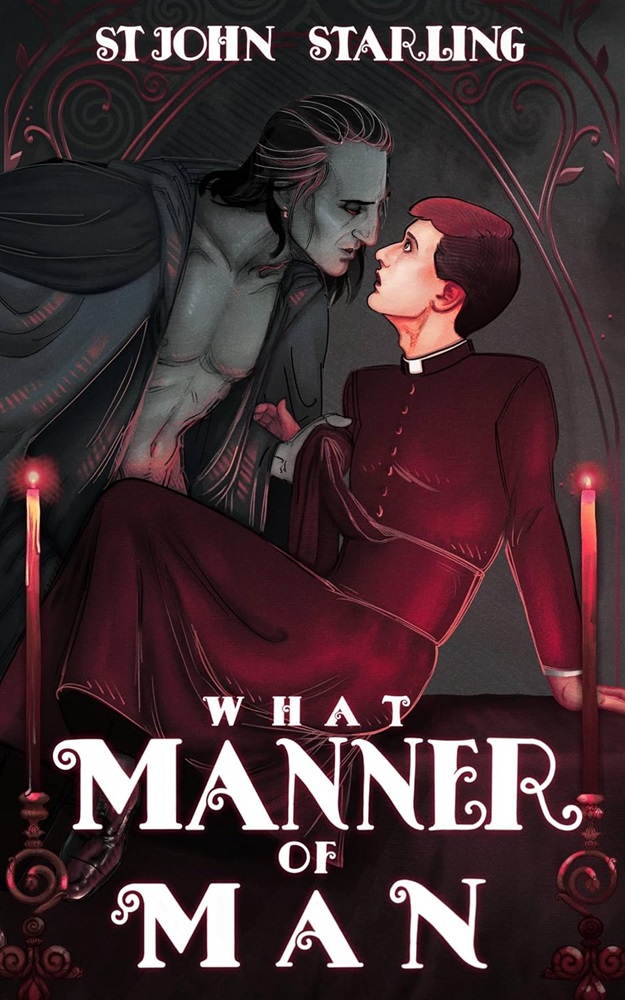
Genres: Adult, Fantasy, Historical Fantasy, Horror, Queer Protagonists
Representation: M/M
PoV: First-person, past-tense
ISBN: B0DKL1DPW2
Goodreads

What would tempt you to sin?
A sweet and naïve priest at war with his desires, tormented by nightly dreams of a wicked demon.
A vampire lord forced to do the unthinkable, battling needs he can scarcely control.
Father Ardelian has been summoned to a distant, secluded island to perform an exorcism. What will happen when he begins to suspect his host — the mysterious, nocturnal lord of the manor — of wanting him for another reason entirely? Will the piously celibate priest be able to resist his monstrous host’s diabolically seductive charms?
What Manner of Man is a blasphemous queer horror romance about a priest and a vampire, inspired by Bram Stoker’s Dracula. A tale of forbidden love with themes of devil worship, demonic possession, and human sacrifice — this is the long-awaited completed version of the widely beloved story which rose to fame and fortune in the form of a newsletter!
Highlights
~follow the spirals
~a deeply disturbing tapestry
~they’re lesbians, Harold
~bat wings > angel wings
~an ancient curse
~touch eternity
~a little kink, as a treat
I don’t read a lot of Gothic anything, but I enjoyed this one IMMENSELY!
What Manner of Man appeared on my radar as a queer Dracula retelling – and to be clear, it really isn’t that; the set-up is very different, and the word ‘vampire’ is never used at all (bizarre in context, honestly, I don’t know how our MMC didn’t ever wonder about vampires). Lord Dracula is unambiguously evil; Lord Vane, the ‘Dracula’ figure of WMoM, is not at all. Etc. So this is lacking a lot of what I’d expect from a Dracula retelling, but, I still think it’s fabulous and very worth reading. If you enjoyed Gaywyck by Vincent Virga, I think you’re likely to enjoy this as well; there’s a similar sort of defiant over-the-top-ness, the feeling of a story that is unashamed of itself, even if some people might think it’s ridiculous. (I believe this is a common signature in all things Gothic, tbh.) If you’re willing to embrace that, you’re going to have fun.
Victor, our priest, is kinda naive – but for me at least, it mostly came off as funny and sweet, and luckily you can see that naivete rubbing off chapter by chapter, so if it annoys you, it shouldn’t do so for long. The gradual evolution of his naivete into idealism was gorgeous to watch, and I liked how WMoM made me think about the relationship between those two things – naivete and idealism – in a way I don’t think I have before.
Anyway: Victor, being one of the few modern (it’s 1950) priests who knows how to perform an exorcism, is sent to a remote British island to assist a Lord Vane, who has begged the church for demon-related help. When Victor arrives (not before), Vane explains that his ancestral manor is possessed (it is a tenet of Catholicism that buildings can be possessed, as well as humans). Victor pretty quickly comes to believe that it is in fact Vane who is possessed, not the building, a conviction he makes sure to hide from his host. In the process of searching for more information about the possession, Victor starts to uncover the not-so-deeply-buried mysteries of the island – complete with secret passageways, underground cave networks, and ancient pagan altars – and what is actually going on with the lord he’s so hypnotised by.
And all of it is told in epistolary format (very Dracula-esque!), via Victor’s journal entries and letters written to his sister. I adore epistolary when it’s done well, and I thought it was done very well here; for one thing, Starling has clearly put a lot of thought into what someone would believably write down versus what they would not, and even if it was sometimes a bit frustrating to not always get every detail, I did appreciate that Victor’s writing always felt natural. There were never any instances of the forced, clunky moments where an author can’t figure out how else to give the reader the info, and thus has the character speak/write in a very nobody-speaks-like-this way. The strike-outs and outright illegible bits of Victor’s journal entries made him feel much more real to me; I could feel his confusion or embarrassment or horror in what he couldn’t bring himself to commit to paper, and I loved that.
I didn’t always find Lord Vane as believable, but that may have been deliberate; he’s charismatic and charming, but sometimes the things he would say struck me less as the demon in this man is trying to scandalise a priest and more off-note, slightly awkward. I believed in Victor’s earnestness; Lord Vane made me roll my eyes a few times. But again, that might have been on purpose: it’s not impossible that Starling deliberately wanted this character to feel ‘off’, to drive home his strangeness, his otherness.
The Gothic vibes, though, were fantastic: the huge, deeply creepy house, complete with sexually-demonic furnishings; the abandoned cathedral; the sword-fights; the storming weather! The atmosphere was perfect, as was the way WMoM clearly revelled in its genre; it felt less like a story featuring the expected tropes than one honouring and delighting in its genre’s iconography. The Catholic aspect didn’t hurt at all; the suffering-as-piety, the sacrificial/Communion motif, the terrible conflict of a genuinely pious priest being Deeply Tempted, was all delicious.
I had become like an animal, and, as an animal, all that was left for me was to die. I had forfeit that divine spark that all man is heir to, and in exchange I had become capable of anything – everything.
My one critique, re the Catholocism, is a slight spoiler, so under a cut it goes: View Spoiler »
Which leads us to the love/attraction itself. The chemistry is smouldering – again, not at all hurt by the threads of blasphemy underlying so much of it, plenty of which is reasonably kinky (ropes, human sacrifice, a little blood-drinking: much approved!) Victor is a sexual submissive and is Very Into his probably-possessed lord manhandling him (the scenes where he writes about ‘submitting to Jesus’ will clue readers into his preferences long before they become obvious to himself) and the mandhandling is, um. A+. Full marks to Lord Vane!
When he beckoned to me, I fell to my knees before him and kissed the hem of his white garment. In that moment, to me, he seemed like a vision of Christ. I knew deep in my heart that this was wrong, that the desire that drove me to do this was sinful, and yet in that I could find no defence against it. It was as if the wrongness were itself the spur that drove me on. He held his hand out to me and I kissed the ring there.
Victor, you kinky little bastard. (Good for you.)
I felt – oh, it was what drives better men to the whip and the thorn.
But like all the best Gothic heroines, Victor is not uselessly swooning; he’s an active character, determined to save Lord Vane, the rest of the islanders, and himself, in that order.
My heart is that of a wolf, not a lamb – a serpent, not a dove.
His idealism, his determination to be good – even as he comes to embrace a freer, wilder side of himself that he considers dark – is not frailty but arms and armour, and I can’t imagine any readers not growing to respect it – except for those uncynical enough to respect it right away.
What Manner of Man is a little rushed, and I wasn’t entirely satisfied with the explanation we got for Lord Vane and the rest of the supernatural goings-on – it felt kinda vague and handwavey to me, when I wanted a lot more detail and a clearer understanding of how a lot of it worked. (Did I miss anyone explaining the magic food prep???) Lord Vane is never very evil, and I wasn’t sure where Victor was getting the idea that he was. The blurb is fairly misleading; this is only barely a vampire story, and it’s not at all horror-y!
But it’s so much fun: a little pulpy, gleefully Gothic, very sexy, very self-aware and deliberate. Intense, and super readable; the prose just runs away with you, so that you’ve inhaled half the book in one sitting when you only meant to read a chapter! The imagery is glorious, the atmosphere perfect, and any ex-Catholic queers out there are sure to enjoy all the queering of the Church’s aesthetic. (I know I did.)
I guess it’s not quite for everyone, but it’s delicious, and I recommend it wholeheartedly.






Leave a Reply